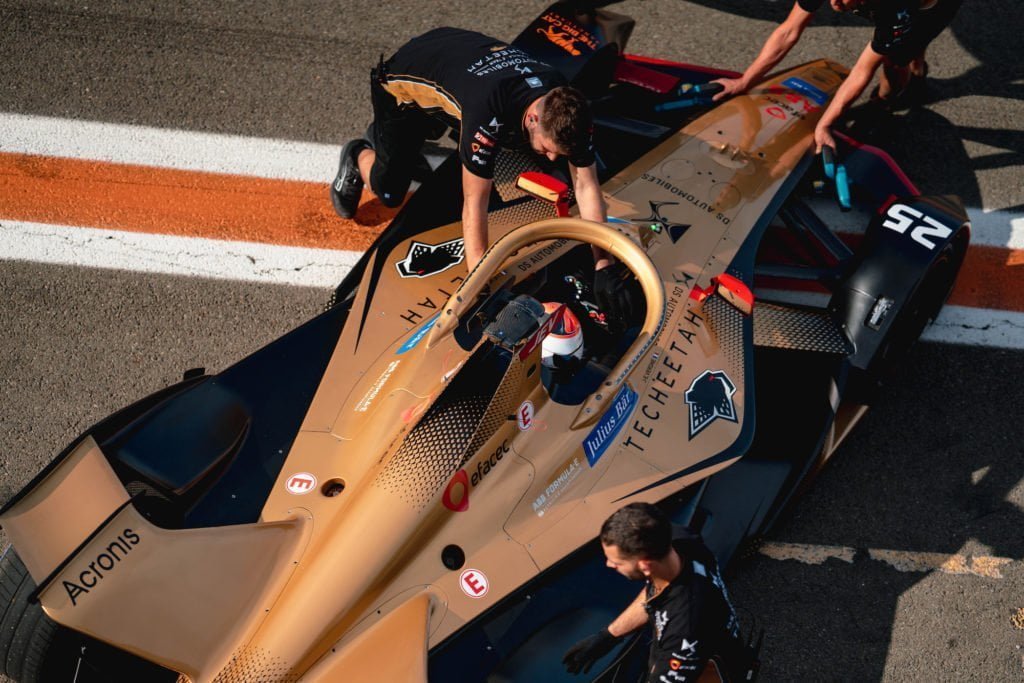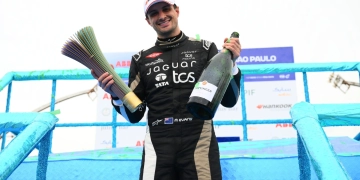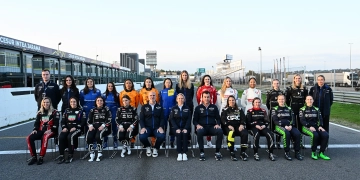From being an undeserved Red Bull reject to achieving glory in the world of Formula E, DS Techeetah’s double Drivers’ Champion Jean-Eric Vergne can be held aloft as a prime example of how a driver turned their career around…
The world of sport is a complex, breathing machine, filled with intrigue, politics, drama, and passion but when an athlete gears up for competition, it is the ultimate will to win that guides them in their pursuit of excellence. Chasing a long-term goal demands more than physical fitness, and mental strength acts as the cornerstone of every encounter. To beat a rival, a sportsperson must first beat them self and this consistent resilience – fending off doubt when it does creep in – is key to tasting success in the arena.
From being an undeserved Formula 1 reject to achieving glory in the world of Formula E, Jean-Eric Vergne can be held aloft as a prime example of how a driver turned his career around. Often described as one of the best racers of the present age, the Frenchman’s profound determination and self-belief has provided an all-important collection of keys – the set that unlocks the chest that houses his constant desire to improve.
Living in lockdown, MotorsportWeek.com’s sister publication Motorsport Monday caught up with Formula E’s most successful driver from the comfort of home. Discussing the importance of mental strength, Vergne explained that it is the trait that separates drivers apart, likening psychological comfort to an unexpected scenario – like being prepared for an exam at school.
“Mental strength is important because it allows you to not make mistakes and allows you to perform under pressure,” explained Vergne who was calling in from France. “I think this is the difference you see between drivers. Drivers with good mental strength are the ones who will perform throughout the season. I don’t know if there is a way to improve mental strength but I think it’s a bit like being at school.
“When you put in a lot of work into a course and subject and then do the exam, you are kind of peaceful because you know you have done the job. Therefore, you don’t have that necessary pressure that’s coming on you and you can perform at your best. It is a little bit the same in any sport. You should be training properly. If you know your subject by heart, you know what you’ve got to do. You know your strengths and then you can be more clear in your mind.”
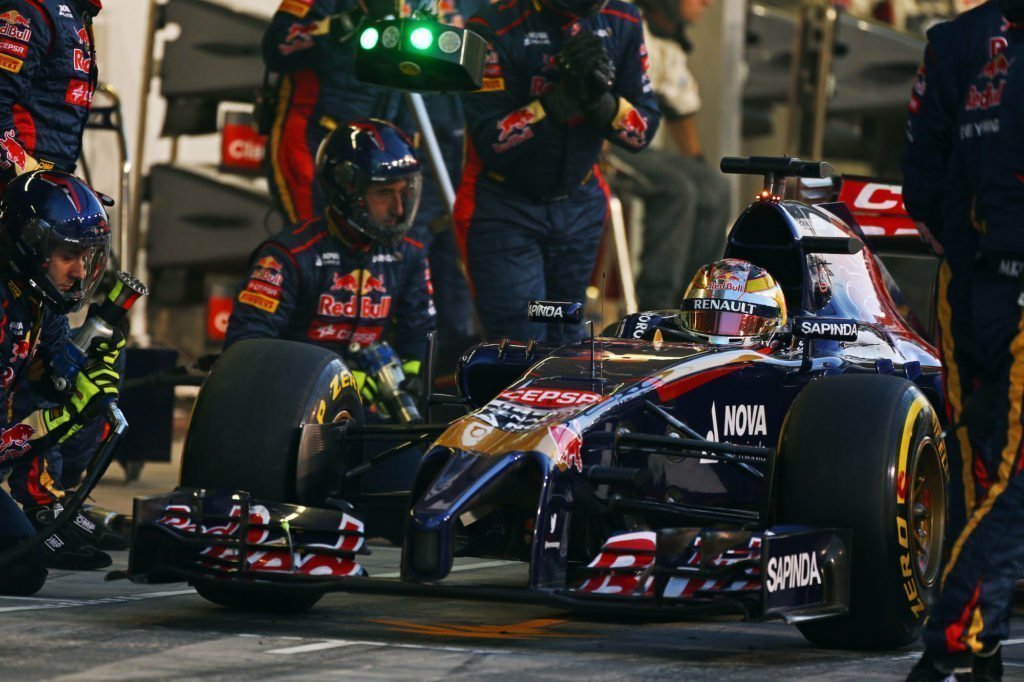
As a top-tier single-seater series, featuring high-profile figures including Felipe Massa, Stoffel Vandoorne and of course, Vergne, Formula E is often likened to Formula 1, but the two are far from comparable. A distinct distortion of performance in the prior is juxtaposed by the unpredictability of the latter, and with 11 different winners in the past 18 races compared to 12 since 2010, Formula E requires a different mentality when racing:
“[The performance difference of cars] was my biggest problem in Formula 1, knowing that I was never coming to a race track to fight for a podium,” reveals Vergne. “That was my biggest problem because the car was not at the strongest. It’s not like I was wondering what I was doing there but as a driver, you’re programmed to compete and to be the best and you know that you stand no chance to be the best because you do not have the car. So being in Formula E really gives you this opportunity to have the same car as everybody and therefore, have more or less the same chance as everybody else to be able to win races.
“You really need to have a clear mind and be able to perform at your best, even if yourself or the team has done a bad job, or if you’ve been unlucky. It doesn’t matter the reason. You still need to go into the race trying to do the best job possible and you may think that the victory is not there but you have to think long-term, you have to think about the championship. Sometimes, scoring points in seventh or eighth positions can be the points that you need to win a title. I think with this in mind, you are able to tackle the race in a better spirit.”
“I had weeks where I was having difficulties finding sleep. When there is only one thing that matters to you and it’s winning the championship, all the rest including friends and family comes second.
Since his departure from Formula 1, Vergne’s career in the upper echelons of motorsport has by no means been a walk in the park. It was earmarked by true grit, and the unbreakable desire for success. Taking the FIA Formula E Drivers’ crown at the end of the 2017/18 Formula E season was only the beginning, and as the all-electric series entered its next-generation, Vergne too unlocked the next level of performance.
The unpredictability of Formula E’s fifth season was unmatched in any motor racing category, and with eight different winners from seven teams in the first eight races, it proved to be impossible for any driver to truly gain momentum. From taking the podium in the season-opener to failing to register points for a two-month period, Vergne too struggled to find a baseline of consistency, with the battle not just taking place on the track but also internally.
“Season 5 was not easy, “he explained. “I had weeks where I was having difficulties finding sleep. When there is only one thing that matters to you and it’s winning the championship, all the rest including friends and family comes second. It’s very hard to have a normal life when you’re in these kinds of spirits. You just move through the days. I had this feeling for all of the months of the championship fight and I don’t have a secret remedy.
“You just have to deal with it. Remember that you do something that you love, remember that many people would love to be in your place and that if I don’t win, then I don’t win. But if I lose, I want to know that I’ve done everything in my power to be able to win. And if I don’t win, either the other guy has been better or bad luck has come in the way – that happens in many championships. You just need to do the job and keep enjoying what you do because that’s always important – having fun.”
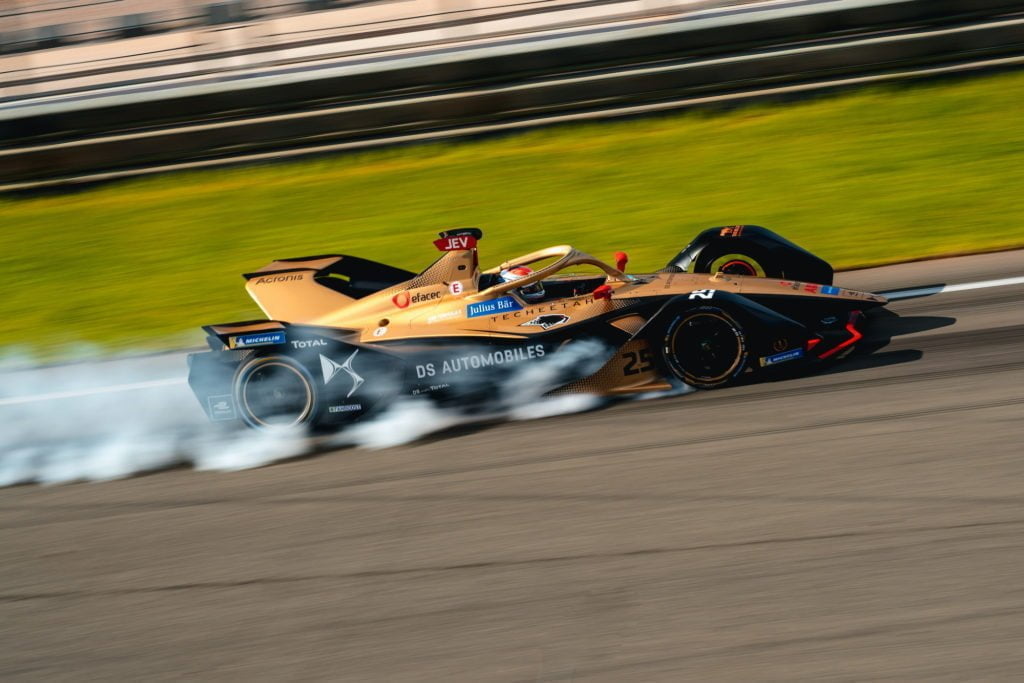
Of the races that formed the 13-event campaign, Vergne highlighted Formula E’s landmark 50th race – the Hong Kong E-Prix – as one of the most difficult moments of his season, with a lack of speed in the race subsequently leading to doubt within his DS Techeetah team:
“After Hong Kong last year, it was difficult,” he explained. “I had a very bad weekend. I had a problem with the car but back then I didn’t know. In the race, I was, on average, one-second off [former team-mate] Andre [Lotterer]. The few weeks after ahead of the race in China were quite difficult in a way that you don’t really know what’s happening. You know that you haven’t lost your talents but some people in the team may see it differently. And when you see people in your team not believing in you the way they should be and they’re losing faith so quickly, it’s quite hard and I don’t think it was fair.”
Bouncing back from his heartbreak in Hong Kong, Vergne reigned supreme in Sanya, China, and once more momentum was back in his favour. A victory at the Principality of Monaco was backed-up by a podium in Berlin and as the season edged closer to its conclusion, Vergne was a contender once more – his title defence back on track.
“My Dad, for example, has always been tough on me but not a bad tough. Tough in a way that when I was winning a race in karting, I was happy and he was the first one to tell me that you’re only as good as your last race.”
Just under four weeks separated the race in Berlin with the next event in Switzerland, and in the time in between, Vergne once more returned to G-Drive Racing to contest the 24 Hours of Le Mans. Longing for redemption after disqualification from victory in LMP2 one year earlier, the battle through the day, the night, and the day again that followed would be a true challenge – the outcome of which would be the most testing moment of Vergne’s career as the iconic race continued to be his ‘unicorn’.
“I’ve had a lot [of testing moments in my career],” recounted Vergne. “The moment where I was really feeling down and there were too many emotions coming was in Le Mans last year when we were leading the race. The year before we won it by so many minutes but then we got disqualified the day after. In 2019, we were again in a position to win it. We had almost a one-lap advantage over second and then a small piece of the starter motor broke and we could not restart the engine.

“I was supposed to do the last stint and I was sitting there to see my team-mates going back in the car. When it was not starting, I thought I was in a nightmare. I thought it was not real and that I was sleeping. This was really hard. Really hard. It was a fantastic race. Every time I was in the car, I was fighting with Nicholas Lapierre. I don’t know for how many hours but it was a 10-15-second margin between the two of us and I loved it. To finish the race in that way was hard but that’s the beauty of Le Mans as well, you know?”
Just seven days on from the darkest moment of his career, Vergne lined up in pole position for the Bern E-Prix, back behind the wheel of his trusty DS Techeetah. With a masterful defensive drive, the French national anthem played proudly on the podium and by establishing a healthy points advantage in the standings, Vergne found himself on the verge of becoming a champion again.
“I think it’s important in this time to reflect on what’s really going on around the world. There are things that are much bigger than us.”
Heading into the final weekend of competition in New York with seven other title rivals, Vergne achieved what appeared to be unachievable earlier in the season. Taking the chequered flag in the final race, a haul of six points sealed a second championship – an achievement matched by no other in Formula E. Celebrating at the close of a tough season was a just reward but with a champion’s mind-set – and with the right driving force behind – Vergne was already looking ahead to the future.
“[Winning the second title] it felt great,” he continued. “My Dad, for example, has always been tough on me but not a bad tough. Tough in a way that when I was winning a race in karting, I was happy and he was the first one to tell me that you’re only as good as your last race. So don’t be so happy and work harder for the next race because the other guys will work harder to beat you and this is when you need to perform. Obviously, he didn’t miss telling me that when I went to see him on holiday after I won my first title! He told me exactly the same. He said ‘now you’ve won one title, that’s great and I’m happy for you, but now go and win another because it will be more complicated.’ And after the second one, he said exactly the same for the third one!”
Fast forward to present day, and the circumstances of the world we live in are inconceivable. In an unprecedented time, life as we know it has come to a standstill – an unbearable halt in an abhorrent period. As the world of motor racing rightly remains on hold, the sport we know and love has taken to the digital realms of esports. Creating his own racing series in Veloce’s ‘Not the GP’, Vergne has been busy away from the track but with eloquent phrasing, Formula E’s double-champion provided a rightful reminder when living in a life of lockdown.
“[Living now] is not a question of staying motivated,” he added. “It’s not the right thing because right now, I’m not thinking about racing. The moment I start thinking about racing, I don’t sleep very well at night and now is not the time for this. I think it’s important in this time to reflect on what’s really going on around the world. There are things that are much bigger than us and it’s a good moment to reflect on what we’ve done, what we want to do, and what we can do in the future.”
You can check out the interview and more inside the latest issue of Motorsport Monday – a free weekly digital motorsport magazine.
